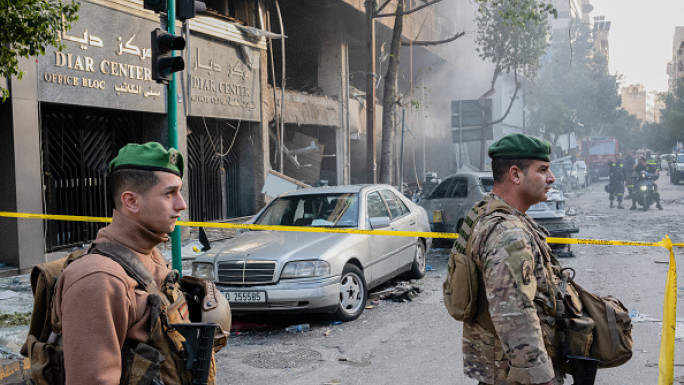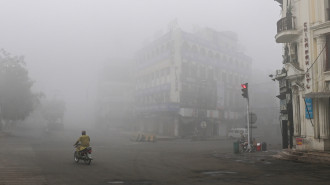
COP29 and environmental apartheid: How war and conflict is bringing us closer to the brink of catastrophic warming

The 29th session of the Conference of the Parties to the UN Framework Convention on Climate Change — also known as COP29 — began on 11 November in Baku, the capital of Azerbaijan.
Some will franticly attempt to quicken the pace of action to confront climate change, given the rise of global temperatures to record levels and a sharp uptick in extreme weather phenomena.
However, it looks as though the issue of war and military emissions will be starkly absent from the conference's working schedule, which will primarily concentrate on funding, and how to facilitate countries' access to the billions of dollars required to enable them to significantly reduce greenhouse gas (GHG) emissions, and protect lives and livelihoods from the worsening impacts of climate change.
Global power dynamics at COP29
Palestinian environmental researcher Asmaa Ashraf is unsurprised that emissions from the US-led global military-industrial sector haven't been discussed at COP for the last 28 years.
"This year will be no different," she tells Al-Araby Al-Jadeed, The New Arab's Arabic-language sister edition.
"These conferences are merely a reflection of the current global balance of power; so in a world order dominated and defined by US interests, we see the same power dynamics in play at the COP conferences."
She points out that "multilateralism — the idea of inviting states from across the world to international forums" on a supposedly "level footing" to coordinate and negotiate — has failed repeatedly, adding that "the most recent case in point is the failure of the UN to stop the genocide in Gaza after the US used its veto power because of its [shared] interests with Israel."
According to Ashraf, the US relies on its military power to maintain its imperial hegemony around the world, whether by assisting Israel's intelligence and military operations or by fortifying its hundreds of military bases around the world.
Therefore, it would go against the interests of the US and its allies to confront the environmental impact of the military at COP, she says.
"Emissions generated during the first 120 days alone of Israel's war on Gaza were greater than the annual emissions of 26 countries combined"
Armed forces and carbon emissions
According to the international education and advocacy organisation Global Citizen, armies consume enormous amounts of fossil fuels, which contributes directly to global warming. Moreover, if the US military were a country, its fuel usage alone would make it the 47th largest emitter of GHGs in the world, according to a 2019 report.
Likewise, explosives and other materials used in modern warfare have hugely damaging effects on wildlife and biodiversity. Pollution caused by war also contaminates water bodies, soil and air, making vast areas unsafe to live in.
Global Citizen has outlined how even during peacetime, armies consume massive amounts of dirty energy (energy produced primarily through extraction or burning of fossil fuels, releasing carbon dioxide into the atmosphere).
For example, the US Department of Defence's 566,000 buildings — including training facilities, factories, and other structures that make up the 800 US military bases around the world — account for about 40 percent of its fossil fuel use.
In terms of wartime emissions, during the last 20 years, the US and its allied forces are reported to have dropped more than 337,000 bombs and missiles on other states.
Aircraft carrying these weapons may burn up to 4.28 gallons of fuel per mile, and additional GHG emissions are released with each explosion.
Vast natural carbon "sinks" comprising land expanses covered in soil, plants and trees are also decimated by intensive bombing.
Gaza
A study titled, A Multitemporal Snapshot of Greenhouse Gas Emissions from the Israel-Gaza Conflict, estimated that emissions generated during the first 120 days alone of Israel's war on Gaza were greater than the annual emissions of 26 countries combined.
The study's co-author Dr Benjamin Naimark said the study highlighted the need for comprehensive reporting of military emissions to the UN Framework Convention on Climate Change (UNFCCC).
As the world grapples with the twin crises of climate change and military conflict, he added, understanding and mitigating the environmental impact of war is critical.
Co-author Dr Patrick Bigger, pointed out that while the carbon emissions caused by Israel's invasion of Gaza weren't the main reason the international community "needed to push for a ceasefire", the research illustrated "some of the long-term social and environmental impacts of war, and served as a reminder that armed conflict is bringing us closer to the brink of catastrophic warming."
"The US has spent billions of dollars on its wars in Ukraine and Israel, but it cannot invest a sufficient amount in new green deals"
Failure of voluntary emissions reporting
Military emissions have long been excluded from obligatory emissions reporting by countries. In the 1997 Kyoto Protocol, after US lobbying, states were exempted from having to report military emissions.
Under the 2015 Paris Agreement, states still don't have to report their military emissions to the UNFCCC. According to the Military Emissions Gap, only four countries currently report this data.
However, while Ashraf says more transparency on CO2 emissions from military operations is urgently needed, this is not the only issue: there is also a lack of enforcement measures.
Moreover, climate targets countries claim to be committed to, whether staying below 2°C of global warming or achieving net zero by 2050, are not binding, she says.
"Thus, the most powerful imperialist powers in these spaces end up dictating the nature of the climate plans proposed and implemented, in the absence of an independent intergovernmental body capable of imposing fair measures."
She adds that state budgets in the US and Western Europe are always generous in allocating funds for defence, but restrained when it comes to climate adaptation projects.
"The US has spent billions of dollars on its wars in Ukraine and Israel, but it cannot invest a sufficient amount in new green deals."
She adds that the Pentagon alone is responsible for more emissions than most countries around the world, which is "why military action must be at the top of the agenda of the conference dedicated to coordinating international plans to address the climate change crisis, as it is the most polluting, damaging and wasteful industry on the planet."
Ultimately, Ashraf says, "global capital's plan for a green transition is inadequate, slow, and completely uninspiring," warning that we are set to face "catastrophic" changes to our climate if we "simply maintain our current rate of economic growth, which would put us on track for a temperature rise of at least three degrees above industrial levels."
She stresses that wars are incompatible with the decent environmental future we desire. Despite that, "the powerful spare no effort to enforce their interests, through militarising borders to block climate refugees, in addition to plunging into more wars for control of resources."
This is what political ecologists have referred to as an emerging global system of "environmental apartheid," she warns.
"The clear failure of multilateral institutions to deliver climate justice reinforces the need for urgent, coordinated political action from the bottom up," Ashraf adds.
"The Western climate justice movement has repeatedly stated that it views Palestinian national liberation as a prerequisite for climate justice and a just global green transition."
This is an edited and abridged translation from our Arabic edition. To read the original article click here.
Translated by Rose Chacko
This article is taken from our Arabic sister publication, Al-Araby Al Jadeed and mirrors the source's original editorial guidelines and reporting policies. Any requests for correction or comment will be forwarded to the original authors and editors
Have questions or comments? Email us at: info@alaraby.co.uk







 Follow the Middle East's top stories in English at The New Arab on Google News
Follow the Middle East's top stories in English at The New Arab on Google News


